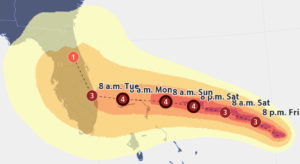Hurricane Dorian is an incredibly frustrating storm that currently has the entire state of Florida in the “cone of uncertainty.” Residents and business owners from the Keys to Jacksonville are in “wait and see” mode. It’s almost humorous to me that the weather service, which is in the prediction business, can have forecasts that are off by 500 miles and still be “accurate,” but I digress. I have been through many hurricanes, including the big dog Andrew in 1992, and I have a few thoughts and communications tips as we wait for the next advisory.
- Do what you can to help your customers and clients. This morning I noticed a restaurant in my neighborhood left its outdoor flat-screen TVs on and tuned to the Weather Channel. Somebody at Gyu-Kaku Japanese BBQ realized that even though they aren’t open for breakfast, why not leave the TVs on overnight so people who pass by can get the latest info. The Miami Herald lowered its paywall for the duration of the storm. I think they view it as a public service, and the publishing company has a long history of supplying information during hurricanes. If there’s something you can do to help your clients, even if it’s a little thing, give it a try as you can build goodwill over time.



